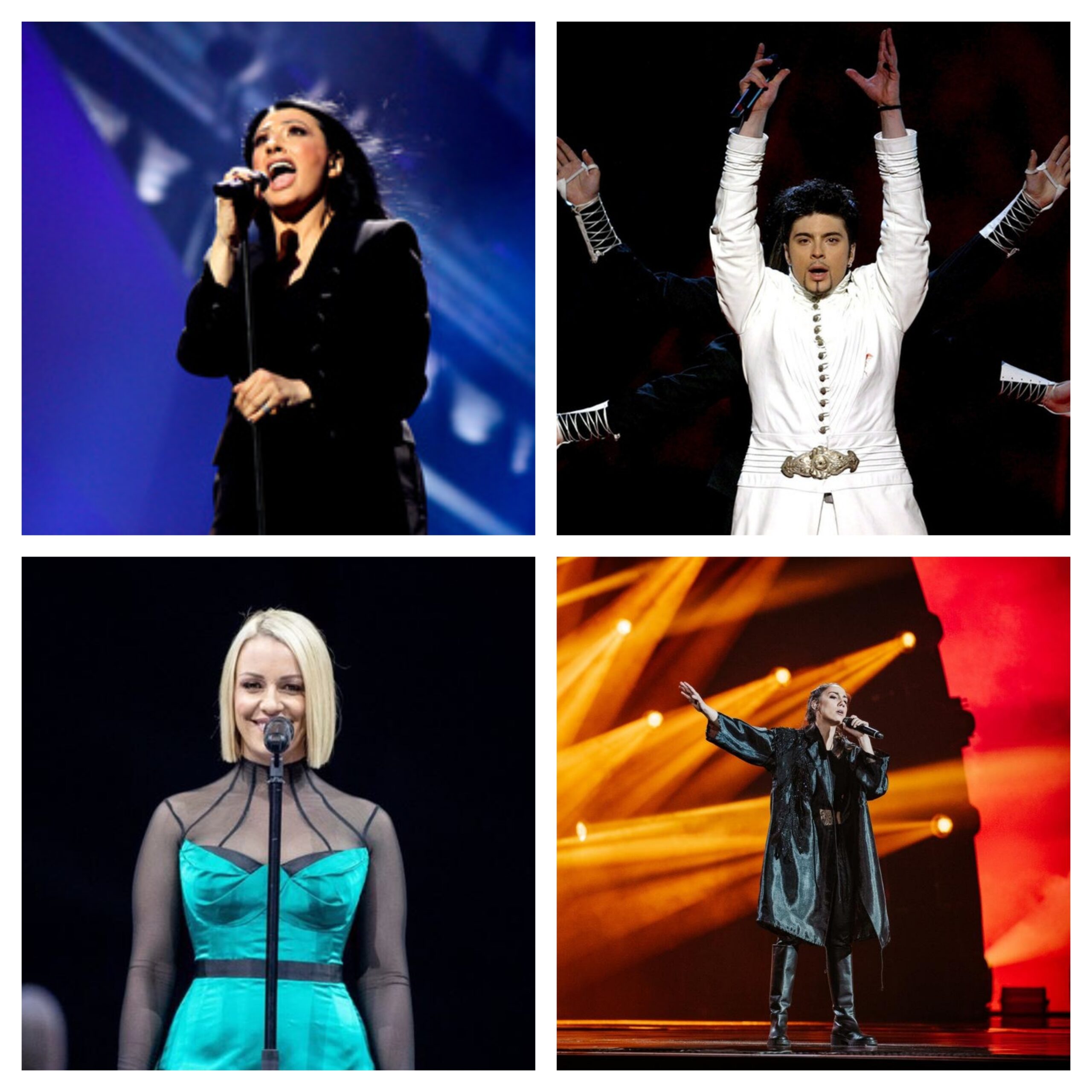Photo Credit: EBU
Every country has had its own relationship with the world’s most popular song contest but there aren’t many countries that have had such a difficult and unlucky time at Eurovision as North Macedonia.
Like many other countries, North Macedonia is an enthusiastic member of Eurovision who made its official debut in 1998. In this article, we take an alternative look at the history of North Macedonia in Eurovision highlighting some of the reasons why they’re unlucky in this contest, but also showing the best Eurovision moments of this proud and determined nation.
Yugoslavia
Before North Macedonia became an independent nation in 1991, they were a part of Yugoslavia. Yugoslavia first took part in Eurovision way back in 1961. They always used a national final originally called Jugovizija which was organised by their broadcaster JRT. Many of the public broadcasting centres were invited to select a song and the winning song would go on to represent Yugoslavia in Eurovision. These were the broadcasters from Bosnia and Herzegovina, Croatia, Kosovo, Montenegro, North Macedonia, Serbia, Slovenia, and Vojvodina. This selection was held almost every year. Some of them had success such as Croatia who won 13 times and Slovenia won 6 times. North Macedonia only won the contest once in 1980. Unfortunately, Yugoslavia had withdrawn from Eurovision between 1977 and 1980, therefore their winner Maja Odžaklievska couldn’t take part in Eurovision. As a result, North Macedonia didn’t have a single entry that they were responsible for when Yugoslavia took part in the contest.
North Macedonia’s First Participations
One of the biggest music festivals in Yugoslavia was Skopje Fest which ran from 1968 to 1980. These featured many popular Macedonian singers as well as performers from the rest of Yugoslavia.
After gaining independence from Yugoslavia, North Macedonia revived Skopje Fest in 1994. The country decided to use this festival as their national selection for Eurovision for their intended debut in the contest in 1996. Bosnia and Herzegovina, Croatia, and Slovenia debuted in 1993 with North Macedonia being the next former Yugoslav nation to join the Eurovision party, hoping for a successful debut. They were represented by Kaliopi who won Skopje Fest with her song ‘Samo Ti’.
In a Eurovision first, to cope with the ever-growing number of nations wishing to take part in the mid-late 1990s, the EBU decided to introduce an audio-qualifier round where the 29 countries who wished to compete in 1996 would have juries alone listen to the audio of their songs. Each country’s jury would then give their 1-12 points to their Top 10 songs, as per the Eurovision format. The Top 22 countries would join the hosts Norway in the Eurovision 1996 final.
It was revealed on 22 March 1996 that North Macedonia didn’t make the Top 22 and therefore would not compete in the final. This audio-pre qualifier was controversial for numerous reasons, but North Macedonia wasn’t the only non-qualifier; Russia, Romania, Hungary, and three former winners, Denmark, Israel, and most shockingly Germany missed out. The results of the qualifier were initially a secret, but it was later revealed that North Macedonia finished in 26th place.
As they didn’t make the final, the EBU hasn’t counted this as an official debut. A few of the competing countries weren’t happy with this new qualifier format and as a result, the EBU introduced a new relegation system in 1997 where the 25 countries that were allowed to compete were determined by the country’s average point score from 1993-1996. This system wasn’t without its flaws, however. It did put countries who had already been relegated or failed to qualify in 1996 at a disadvantage as they counted their scores as 0 for that year, and therefore this lowered them down the rankings. It also put new countries that were debuting at a disadvantage as well. Because North Macedonia was down as having scored 0 points in 1996 in their only Eurovision attempt, they weren’t allowed to compete in 1997 because of their low score. They would have to wait another year to make their official debut.

North Macedonia Takes To The Stage
In 1998, for the first time, a North Macedonian was about to sing at the Eurovision stage. Because the nation missed out in 1997, North Macedonia, as well as Slovakia, Romania, Israel, Belgium, and Finland were allowed to come back and join the Top 18 countries with the best average score over five years.
Skopje Fest was once again used as the selection process to decide their entrant. Vlado Janeski won the festival and he sang ‘Ne Zori Zoro’ in Birmingham. The pressure was on as the debutant countries were performing last hoping to make a big impression on the whole continent. The relegation system also made it tough because North Macedonia needed a good result to guarantee a spot in the 1999 contest. They finished in 19th place scoring 16 points, which wasn’t great but many countries in the past had scored worse with their first Eurovision song. However, this wasn’t enough for them to qualify for 1999, so they had to sit out. As the average table shows, they needed around 40-45 points to secure a place in the final in 1999. So, they had to wait until 2000 to return.

Despite the relegations, Skopje Fest continued each year but it just meant that the winner couldn’t compete in Eurovision. North Macedonia returned in 2000 when girl band XXL who won the selection were bringing the fun with their song ‘100% Te Ljubam’ (I Love You 100%). Their song was catchy, and full of energy. The live performance has since become a hit amongst Eurovision fans with one video having over 1 million views. It’s become famous primarily for the live vocals on the night. Ultimately, the jury and public did not love their song 100% and did not understand it from an academic perspective. They scored 29 points from only 4 countries and finished in 15th place which until 2004 became their best result ever!
Once again this score wasn’t enough for the nation to qualify for the 2001 contest and they had to wait until 2002 to take part again. This pattern continued as their entrant Karolina finished in 19th place scoring 25 points which meant again that in 2003, North Macedonia missed out. This was because the bottom 5 countries of the 2002 contest were relegated but because Germany was in the ‘Big 4‘, although they finished in 21st place, as a member of the Big 4 (as well as Spain, France, and the UK), they were allowed to take part every year and not be affected by the relegation rule, this meant North Macedonia unluckily had to miss out. However, this would be the last time the nation would not compete in 20 years thanks to a major shake-up to the format.
Semi-Finals and Success
With many more nations wishing to compete in Europe’s biggest song contest, the format of the contest was changed so that a Semi-Final was introduced in 2004. This meant that all countries could compete without being relegated. The rule was that the ‘Big 4’ and the Top 10 countries in 2003 would get an automatic pass to the final automatically but the remaining 22 countries would take part in this Semi-Final.
In 2004, Toše Proeski was internally selected to represent the country with Skopje Fest just being held to decide the song. He was no stranger to the festival as he had missed out on representing them a couple of times back in 1998 and 2000. Now, a massive star domestically, he was determined to give them a great result with his song ‘Life’. But first he had to pass the Semi-Final. This was a tough ask as he needed to make the Top 10 of 22 songs and all 36 competing countries were allowed to vote. He performed the song well, the presentation was elaborate and featured a choreographed routine of dancers with chairs around the stage, as he powerfully sang his song to a big cheer from the crowd. North Macedonia managed to qualify for the first time finishing in 10th place scoring 71 points scoring points from 16 countries. For the final, the same success couldn’t quite be replicated. He finished in 14th place scoring 47 points which was still a good result. The song ‘Life’ and the lyrics of the song have since become very poignant as Toše tragically passed away in a car crash in 2007.
North Macedonia’s success in the Semi-Finals continued as they qualified in 2005, 2006, and 2007 which was no mean feat as back then when there was only 1 semi-final, and between 22 and 28 countries took part so consistently making it in the Top 10 each year was amazing. In those days, as I mentioned before, if you made in the Top 10 in the final or were a member of the ‘Big 4’, you’d automatically have a pass to the final. North Macedonia unfortunately each year either just missed out or fell short of that. In 2005 they finished 19th, in 2007, they finished 14th, but in 2006, they achieved their best-ever result for many years, finishing in 12th place in the final. Elena Risteska and her song ‘Ninanajna’ gave the nation its first-ever left-hand side-of-the-board finish. However, they were unlucky in the sense that in order to get a pass to the 2007 final, they had to be in The Top 10 therefore only just missing out.
Introduction Of Two Semi-Finals
In 2008, to accommodate even more countries taking part (there were now 43 nations taking part), there would now be two semi-finals. All countries would compete in them apart from the Big 4 and the host country. This meant everyone else had a fair go at the show and did not have to worry about being in the Top 10 of 22-28 countries. There were still 10 qualifiers and each semi had either 18 or 19 songs competing. Another rule change was that although the semi-finals were still televote only, there would be a backup jury qualifier. This meant the Top 9 countries would definitely advance but the jury was able to pick their favourite song out of the other songs which didn’t make it through regardless of where they finished with the televote. This was a controversial rule and I’ll explain how that affected North Macedonia quite badly.
In 2008, Tamara, Vrčak, and Adrijan performed ‘Let Me Love You’ and finished in 10th place with the televote scoring 64 points which should have safely put them through. But Sweden, despite finishing in 12th place with 54 points won with the backup jury and they took the final spot. What makes this more agonising is North Macedonia was only 3 points off 9th-placed Albania in the semi-final.
History repeated itself the following year as in 2009, this rule was still enforced. North Macedonia finished with 45 points putting them in 10th place again but the jury picked Finland as their qualifier even though they finished in 12th place which meant for a second year in a row, North Macedonia should’ve qualified. They finished in the Top 10 in their semi consecutively 6 times.
| 2008 Semi Final Results: 8) 🇮🇸 Iceland 68 9) 🇦🇱 Albania 67 10) 🇲🇰 North Macedonia 64 11) 🇧🇬 Bulgaria 56 12) 🇸🇪 Sweden 54 13) 🇨🇭 Switzerland 47 | 2009 Semi Final Results: 8) 🇵🇹 Portugal 70 9) 🇷🇴 Romania 67 10) 🇲🇰 North Macedonia 45 11) 🇲🇪 Montenegro 44 12) 🇫🇮 Finland 42 13) 🇧🇾 Belarus 25 |
In 2010, the rules changed so that both the semi-finals and final will be a 50/50 split between the televote and the juries, and the Top 10 countries alone would qualify which was a much fairer process. Unfortunately for North Macedonia, for the first time ever in a semi-final, they didn’t finish in the Top 10. They finished in 15th place but ironically despite them doing really well with the televote in previous years. North Macedonia actually qualified with the juries. They also failed to qualify in 2011 but this time failing to qualify with the public and finished up in 16th place in their semi-final.
Kaliopi, who would have been North Macedonia’s official first representative was internally selected to represent the country in 2012 and she finally had her moment of redemption. Her song ‘Crno I belo’ (Black and White) became their first qualification since 2007. She nearly matched Elena’s result in 2006 as Kaliopi finished in 13th place scoring 71 points, despite being in the lead in the very early stages of voting.
North Macedonia’s Non-Qualification Streak
After 2012, North Macedonia began to really struggle to find their feet in the contest and they struggled to make the final. In 2013, Esma and Lozano sang ‘Pred Da Se Razdeni’. Esma Redžepova was another massive star with an established career in Yugoslavia and was very popular in the Romani community? But she and Lozano couldn’t give them a good result finishing 16th out of 17. In 2014, although Tijana sang her catchy pop song ‘To The Sky’ which qualified with the juries safely but the public ranked them low and they ultimately missed out. After finishing second last in their semi-final in 2015, Kaliopi was once again internally selected to represent her country in 2016 and she sang ‘Dona’ hoping for another good result but alas, she finished in 11th place in the semi-final and just missed out despite being a televote qualifier.
In 2017, North Macedonia internally selected Jana Burčeska to sing ‘Dance Alone‘. It became one of their most hyped entries ever due to it being a contemporary pop disco song, was very catchy and many fans thought this could give them their best result ever. She often finished in the Top 10 of various fan polls, though it is good to know that these fans are only a small subsection of the people who watch and vote in the contest. They also typically judge the song just from the studio version alone.
Unfortunately, she finished in 15th place overall and missed out in the Semi-Final. It wasn’t all bad news for Jana on the night though. In a Eurovision first, as one of the green room presenters Timur Miroshnychenko was interviewing the contestants, he went over to Jana and the delegation. He interviewed Jana, congratulated her on her pregnancy, and then he passed the microphone to her boyfriend. Jana’s boyfriend proposed to her live on air much to her delight and amazement! She said yes and the crowd went wild and it was such a happy moment for everyone. Jana may not have made the Eurovision final but she did get engaged!
2018’s North Macedonian entrants Eye Cue also had hype amongst Eurovision fans with their reggae fusion and pop song ‘Lost and Found’ which effortlessly fused the genres and was tipped to do well again. Once again, the live performance didn’t quite have the full effect of the studio version and they finished in 18th place out of 19 in a semi-final which many fans have described as the toughest semi-final they’d ever seen.
Proud
In 2019, despite having one of the longest non-qualification streaks amongst all the semi-final countries, North Macedonia didn’t give up. After disappointment in 2008, in her 2nd appearance at Eurovision, Tamara Todevska was internally selected by the broadcaster MRT to sing the ballad ‘Proud‘. Speaking to Eurovision, Tamara said:
“I dedicate “Proud” to my daughter and to everyone out there fighting for their dreams and believing in their greatness. On the 16th of May, we will break the rules and at least for one night in the year, we will show the world that I AM PROUD is always stronger than their YOU WILL NEVER BE GOOD ENOUGH!”
— Tamara Todevska speaking to the Eurovision website
The themes of the song were female empowerment and the video featured her three-year-old daughter Hana. It was a simple but powerful song.
The staging was minimal for the performance, it featured Tamara alone with LED screens that showed a mirror effect behind her. Throughout the instrumentation pictures of Tamara, her daughter, and various women and girls were shown in black and white. The final shot had an image of Tamara and her daughter together smiling. It was emotional, heartwarming and Tamara’s vocals were flawless. It was clear we were watching something very special.
For the first time since 2012, North Macedonia was revealed to be a qualifier for the Grand Final. Despite the excitement for them, North Macedonia were only 15th in the odds to win Eurovision 2019 on the night of the final, but after another brilliant performance, they defied expectations. As the jury results were coming in, North Macedonia was picking up points left and right and after a couple of 12 points, they were in the lead! This momentum carried on throughout the jury votes and North Macedonia became the first, and to date only Eastern European nation to win with the professional juries since the 50/50 Jury/Televote split results were established in 2009. After all the years of struggling to qualify, and all the unlucky moments throughout the country’s Eurovision history, North Macedonia finally had some major success at Eurovision.
(Note: In the actual live final broadcast, North Macedonia were revealed to have finished in 2nd place with the juries and they were the 2nd last country to have their televote score revealed, but days after the contest, it was found out that the Belarusian jury results were upside down and the 12 points were given to the last placed country. Once the correct results were revealed, North Macedonia finished ahead of Sweden in the jury count.)
North Macedonia scored 58 points with the televote which put them 12th with the public which was still a decent score. It meant that overall the nation finished in 7th place scoring 305 points. This became North Macedonia’s first-ever Top 10 result and remains their best-ever finish yet.
The 2020s
After the success of Tamara, one of her backing vocalists Vasil was internally selected to represent them in 2020 and 2021 after the cancellation of Eurovision 2020. North Macedonia hasn’t qualified since 2019 though they did come close again back in 2022, when Andrea sang ‘Circles’ finishing in 11th place despite being a jury qualifier.
In 2023, for the first time in their history North Macedonia decided to withdraw from the contest because of financial constraints. They weren’t the only country to withdraw from the contest in Liverpool as Bulgaria and Montenegro also dropped out.
Their broadcaster MRT still broadcasted the show and had said they were determined to come back in 2024. North Macedonia have said they will be continuing their participation in Junior Eurovision 2023, so this is a promising sign. We hope to see North Macedonia come back to Eurovision!
Conclusion
Overall, over the history of Eurovision, North Macedonia has always been a proud (excuse the pun) country at Eurovision and even though they never were able to get their moment in the spotlight when they were a part of Yugoslavia, they have since finally had their chance to shine. Although, they’re arguably one of the unluckiest countries at Eurovision from being consistently relegated in the 1990s and early 2000s, missing finals because of the jury backup qualifier rule in 2008 and 2009, to them having one of the longest Non-Qualification streaks that has existed in the semi-finals. Seeing North Macedonia winning the jury votes is a testament to their determination. After all the bad luck they’ve had, they were finally getting some justice, and proving that with the right song, any country can produce a great result.
In my opinion, they’ve sent a lot of really good songs with Dance Alone being my personal favourite. It was a shame that North Macedonia had to withdraw from Eurovision in 2023 as like so many countries if they withdrew, Eurovision isn’t the same without them.
We hope to see North Macedonia back at Eurovision in 2024 and can’t wait to see what else is in store in their Eurovision history!
What’s your favourite North Macedonian entry? Let us know in the comments!
Be sure to follow us on Twitter, Instagram, TikTok and YouTube for more Eurovision content!




